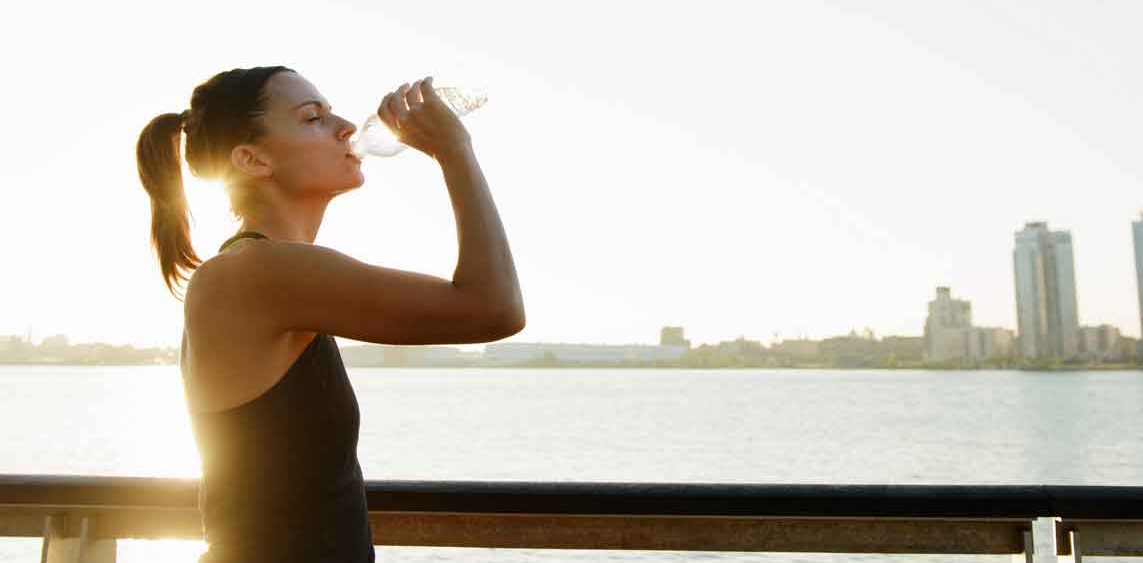How to Stay Hydrated Before, During, and After Exercise

Why it’s important to replenish your body with fluids.
We’ve all heard we should drink adequate amounts of water during the course of each day, and especially while we’re exercising. It makes sense that when you’re doing something that makes you sweat you’ll need to replenish the lost fluids. Being properly hydrated before you go for a run or hit the gym has the potential to improve your performance, whereas being dehydrated can diminish it.
Consider the fact that your body — all your organs, your muscles, and your brain — are mostly water. If you head into a workout dehydrated — especially if you’re doing something that is high intensity or lasts more than an hour — it can negatively impact your strength, performance, and endurance.
What it takes to stay well-hydrated will vary from person to person depending on things like activity level and duration, how much you’ve had to eat and drink, environmental conditions, and your clothing. If you are someone who naturally sweats a lot, you will need to drink more fluids to stay hydrated than someone who sweats less but has a comparable level of activity. In addition to water, when you sweat you’re also losing electrolytes such as sodium and potassium.
YOU MIGHT ALSO LIKE: Dehydration and Heat Stroke
Why does it matter?
Being well hydrated helps your heart more easily move blood through your body and to your muscles, helping your muscles work more efficiently, which is clearly important if you’re working out. In addition, being dehydrated can cause a range of problems, including swollen hands and feet, loss of coordination, headache, cramping, inability to regulate body temperature, and potentially life-threatening heat stroke. Additionally, certain medications can act as a diuretic, and if you have certain health conditions, such as diabetes or heart disease, it’s particularly important for you to stay hydrated.
How can you tell?
It’s important to know that if you feel thirsty, you’re already dehydrated, so using thirst as your cue to drink isn’t the best indicator. According to the American Heart Association, one of the best ways to judge whether you’re adequately hydrated is by the color or your urine. If it’s pale or clear, you’re well hydrated. If it’s dark, you need more fluids.
Another way to tell how much fluid you’re losing during exercise is to weigh yourself before and after. The difference is how much you’ve lost. According to the American College of Sports Medicine (ACSM), the before-exercise measurement is best taken nude, first thing in the morning after you’ve urinated. Then weigh yourself again after exercise. If you have more than a 1 percent loss in body weight, you’re dehydrated. More than a 5 percent loss and you’re seriously dehydrated. To maintain health, these fluids must be replaced.
If you start your workout in a dehydrated state, you’ll be weaker. Simply drinking water or a sports drink during your workout won’t be enough to make up for the deficit you started with. ACSM recommends the following regimen to maintain proper hydration before, during, and after your workout:
How to stay hydrated when you exercise
Before
• Check in with yourself (look at your pee) to determine your hydration status in general.
• Drink 16 to 20 fluid ounces of water or sports drink at least 4 hours before exercise.
• Drink 8 to 12 fluid ounces of water 10 to 15 minutes before exercise.
• A drink with sodium or a small meal helps stimulate thirst and retain fluids.
During
• Drink 3 to 8 fluid ounces of water every 15 to 20 minutes when exercising for less than 1 hour.
• Drink 3 to 8 fluid ounces of a sports drink every 15 to 20 minutes when exercising for more than 1 hour.
• Don’t drink more than 1 quart an hour during exercise
After
• Obtain your body weight, and check your urine to estimate your fluid losses. The goal is to correct your losses within 2 hours of exercise.
• Drink 20 to 24 fluid ounces of water or sports drink for every one pound lost.
More about sports beverages
Once the domain of Gatorade and Powerade, there are now many sports drinks, enhanced waters, and energy drinks on the market. Despite the hype, there are some specific things you should look for if you decide your body needs more than what can be gained by simply drinking water.
The carbohydrates in sports drinks help replenish your body’s glycogen, a form of sugar primarily stored in your muscles and liver, and electrolytes. ASCM generally recommends that sports drinks contain 4 to 8 percent carbohydrate, 460 to 690 mg sodium, and 78 to 195 mg potassium. The need for carbs and electrolytes increases with increasing activity.
Bottom line
Water isn’t just important for athletes and active people; it’s an essential element to everyone’s health because it transports nutrients within your body, helps eliminate waste, helps maintain blood pressure, lubricates joints and tissues, and facilitates digestion. Life isn’t sustainable without water, so whatever your level of activity, make sure you drink up!
YOU MIGHT ALSO LIKE: How to Exercise Correctly During Summer
Updated:
April 08, 2020
Reviewed By:
Janet O’Dell, RN